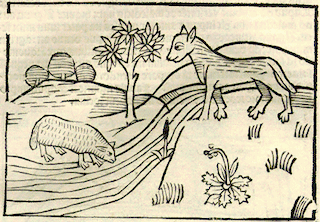‘A wolf in sheep’s clothing’ is someone who hides malicious intent under the guise of kindliness.
A wolf in sheep’s clothing
What's the meaning of the phrase 'A wolf in sheep's clothing'?
What's the origin of the phrase 'A wolf in sheep's clothing'?
The cautionary advice that one cannot necessarily trust someone who appears kind and friendly has been with us for many centuries. Both Aesop’s Fables and the Bible contain explicit references to wolves in sheep’s clothing. On the face of it, Aesop must have originated the phrase as his tales are much older than any biblical text. The question is, when did the phrase first become part of the English language?
The version of Aesop’s Fables that is best known to us today is George Fyler Townsend’s 1867 translation, in which he gives the Wolf in Sheep’s Clothing fable this way:
Once upon a time a Wolf resolved to disguise his appearance in order to secure food more easily. Encased in the skin of a sheep, he pastured with the flock deceiving the shepherd by his costume. In the evening he was shut up by the shepherd in the fold; the gate was closed, and the entrance made thoroughly secure. But the shepherd, returning to the fold during the night to obtain meat for the next day, mistakenly caught up the Wolf instead of a sheep, and killed him instantly.
The King James Version of the Bible, 1611, gives this warning in Matthew 7:15:
Beware of false prophets, which come to you in sheep’s clothing, but inwardly they are ravening wolves.
The earliest English version of that biblical text is in John Wyclif’s translation in 1382:
Be ye war of fals prophetis, that comen to you in clothing is of scheep, but withynneforth thei ben as wolues of raueyn.
The Aesop’s Fable version may be an earlier example in English. Aesop (620–560 BC) is credited with creating the fables that bear his name and, whether he was the author or not, they are certainly pre-Christian. They were much translated before the first English version, which was Caxton’s translation into Middle English, 1484. Caxton doesn’t use the phrase or even reproduce the fable in the form we now know. His version has a dog, rather than a wolf, masquerading as a sheep.
It appears that the oldest explicit reference to the tale of a wolf dressed in a sheepskin, in print in English, is in Wycliffe’s Bible. Where the writers of the Bible got the story from is anyone’s guess. The cautionary tale wouldn’t have been new to them; some form of the tales that we now know as Aesop’s Fables would have been in circulation in the Middle East at the time the Bible was recorded.
Related phrases and meanings
Browse more Phrases
About the Author

Phrases & Meanings
A-Z
A B C D E F G H I J K L M N O P Q R S T UV W XYZ
Categories
American Animals Australian Bible Body Colour Conflict Death Devil Dogs Emotions Euphemism Family Fashion Food French Horses ‘Jack’ Luck Money Military Music Names Nature Nautical Numbers Politics Religion Shakespeare Stupidity Entertainment Weather Women Work
How did we do?
Have you spotted something that needs updated on this page? We review all feedback we receive to ensure that we provide the most accurate and up to date information on phrases.
